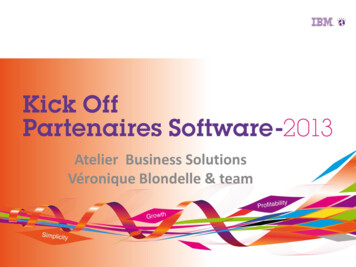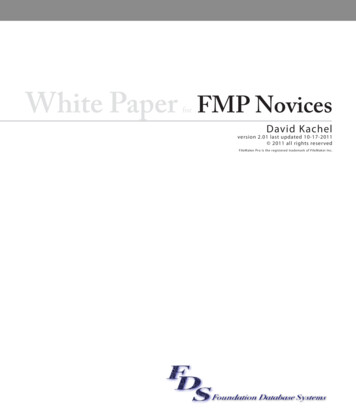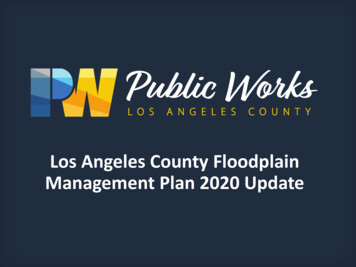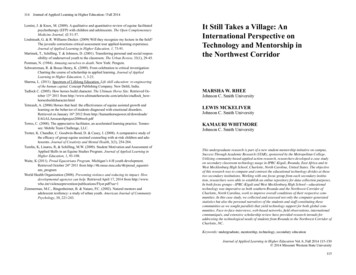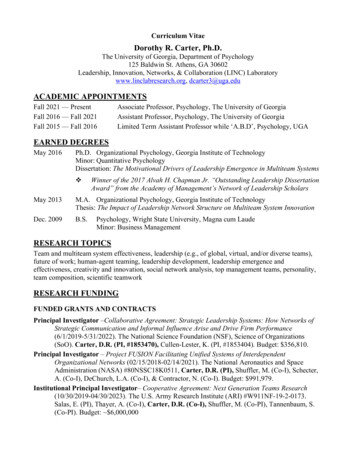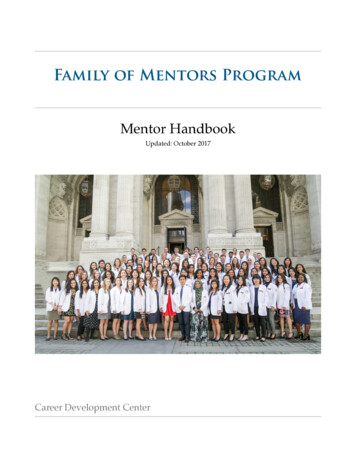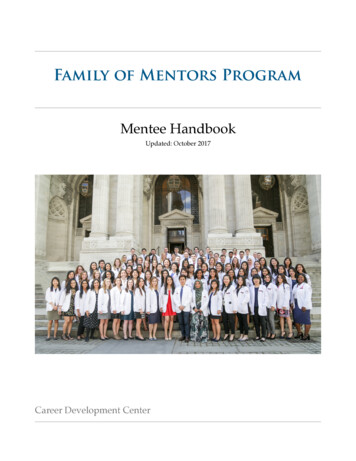
Transcription
Mentee HandbookUpdated: October 2017Career Development Center
Welcome to Family of Mentors! .3FMP Description .4FMP Mission .4FMP Goals .4Mentors .4Matching .5Duration of the Mentor-Mentee Relationship .5Ending the Mentor-Mentee Relationship .5FMP on the SUNY Eye Network .5Mentoring Workflow .5Mentoring Agreement .7Goal Setting .7S.M.A.R.T. Goals .8Examples of S.M.A.R.T. Goals .8Exploratory Questions .9Discussion Prompts and Resources .9Mentor-Mentee Tips.9Mentor of the Year .10
Welcome to Family of Mentors!Welcome to the SUNY College of Optometry Family of Mentors Program (FMP)! Yourdecision to participate in the FMP is one I hope you find rewarding and worthwhile.FMP is a signature program of the Career Development Center (CDC) and one that wasdeveloped to meet the College’s strategic goal to provide students, residents and alumniwith the services to succeed in their career.Mentoring relationships have been shown to be transformative especially for studentsnavigating medical educational programs. As an optometry student, you face a rigorouscourse load and challenging clinical rotations along with extra-curricular activities thatleaves little time for the ever-important relationship building with a mentor. Moreover,since many of you hail from all parts of the country and from other countries, this posesa challenge to creating relationships with mentors close to home. Thus, FMP wasdeveloped to overcome these challenges and help connect you to a caring professional.Your mentor will advise, teach, guide and share his experiences with you as younavigate your educational path. As a student, you will need to make a number ofdecisions important to your career development from deciding whether to pursue aresidency to choosing externship sites and will need guidance and support. But, just asimportantly, you will be developing skills often referred to as “soft skills” such ascommunication, leadership, conflict management, time management, etc., which yourmentor will be an integral part in shaping and refining.The mentor-mentee relationship is, however, a two-way street. As is the case in manymentor-mentee relationships, I would not be surprised that you may wind up teachingyour mentor more than he/she teaches you, helping your mentor develop and growand ultimately inspiring him/her to be better.I look forward to being a part of this journey with you.Sincerely,Quy H. Nguyen, O.D.Director of Career Development and Minority Enrichment
FMP DescriptionFMP is an online and in-person program developed to enhance students’ and residents’personal, academic, and career development and to expand professional networks forstudents, residents and mentors. FMP seeks to capitalize on the vast network of SUNYalumni, professional organizations and partners from which to recruit the most talentedmentors to develop our outstanding student body.FMP MissionThe mission of FMP is to connect students of optometry and residents with mentors in orderto foster a trusting and long-lasting relationship that helps to develop students and residentspersonally, academically and professionally and allows the mentors opportunities to sharewisdom and expertise, develop interpersonal communication, motivation, coaching,counseling, and leadership skills, and build professional networks.FMP Goals1. Establish strong relationships between students and residents and mentors that lastbeyond matriculation at SUNY Optometry2. Enhance students’ and residents’ career development3. Increase students’ and residents’ overall experience and satisfaction at SUNY-Optometry4. Provide a meaningful avenue for alumni, professional organizations and partners to stayconnected with SUNY OptometryMentorsFor the first time ever, we will be leveraging SUNY Optometry’s very own alumni network,the SUNY Eye Network (www.sunyeyenetwork.org), to find mentors. This platform wascreated uniquely to allow alumni to stay connected to the College, as well as offer alumni anopportunity to work with students and residents.
MatchingThe mentor-mentee relationship will be established mutually between the mentor and thementee. Mentees will be allowed access on the SUNY Eye Network, search for a mentor thatfits their needs, and send a request that way.You may request up to 2 mentors, but it is up to the prospective mentor to decide whether tochoose you or not. Once a mentor has accepted your request, this will trigger the start ofyour mentor-mentee relationship!Duration of the Mentor-Mentee RelationshipThe goal of FMP is to create long-lasting relationships that extend the duration ofprofessional careers; however, your mentor-mentee match will be one year, ending atgraduation, with the opportunity to end or continue the relationship at the end of the year.Ending the Mentor-Mentee RelationshipAs in any relationship, you may experience growing pains and bumps in the road, and theCareer Development Center will be available to facilitate, mediate, and help address issuesthat may arise during your mentor-mentee relationship. Should the relationship, however,reach a point where either the mentor or mentee feel that the relationship is no longerbeneficial, a mentor or mentee may choose to dissolve the mentor-mentee relationship withfacilitation by the Career Development Center.FMP on the SUNY Eye NetworkThe whole program, as mentioned previously, will be run on our alumni networkingplatform. Within this platform, all the mentor/mentee matches will be placed into the“Family of Mentors” group so everyone can communicate with one another. The group has amain link to our school website, where all the resources are made available.Mentoring WorkflowThe workflow consists of 3 phases:
Phase 1: Getting to Know Each OtherPhase 2: Delving DeeperPhase 3: ColleaguesPhase 1: Getting toKnow Each Other(30 days)Phase 2: DelvingDeeper(300 days)ReviewMentee/MentorProfileContinue workingtoward establishedgoalsReview mentoringagreement andcreate a schedule ofmeeting days/timesChoose 4-6 questionsfrom ExploratoryQuestions Documentand use as guideEstablish personal,academic and professionalgoalsMeet in-personand/or online at least1hour / monthMeet in-personand/or online at least1 hour/monthRespond toprompts/surveysAttend events &actvities togetherPhase 3: Colleagues(30 days)Mentee GraduatesTransition frommentor-menteerelationship tocolleaguesMentee becomes amentor for a studentor residentMentor takes on anew mentee
Mentoring AgreementThe mentoring agreement will serve as a promise between you and your mentor to fulfill theexpectations and roles of participating in FMP. You and your mentor should review anddiscuss the mentoring agreement at the beginning of your match as indicated in theworkflow chart. The mentoring agreement can be found on our FMP website.Goal SettingSetting goals with your mentor is a great way to create a roadmap for the mentoringrelationship. During Phase 1 you and your mentor should discuss the goals that you want toachieve during your year mentoring period. Once your goals are established, you shouldtrack your progress and goal achievement periodically with your mentor . The goals youand your mentor set should focus on three key areas in your development: 1) PersonalGoals; 2) Academic Goals; and 3) Career Goals.1) Personal goals are goals related to your personal skills or traits. For example, you maywant to have a goal to better manage your stress during exams and assessments or improveher conflict management skills. Improving your personal skills and traits will prove usefulin other areas of her life.2) Academic goals are essential as your professional success hinges on your ability to dowell in school and gain the clinical skills necessary to pass the Boards and earn a license topractice optometry. As each academic year brings new challenges, your academic focus maybe overcoming a difficult course or clinical skill development or landing a covetedexternship rotation.3) Career goals are important as you prepare to enter the workforce. During your time inschool, your will have a chance to explore different specialty areas in optometry, go tovarious externship sites and experience different modes of practice. Your career likes anddislikes will begin to be refined with guidance from your mentor through these experiences.Additionally, you may require help writing a curriculum vitae and cover letter, refininginterviewing skills, learning how to network or enhancing your network, etc.
S.M.A.R.T. GoalsWhen crafting goals with your mentor focus on creating S.M.A.R.T. (specific, measurable,attainable, relevant and time-bound) goals. S.M.A.R.T. goals are effective ways to write cleargoals that are time-bound and will hold you and your mentor accountable. The graphicbelow illustrates S.M.A.R.T. goals.Examples of S.M.A.R.T. GoalsNot S.M.A.R.T.S.M.A.R.T. GoalWrite a CVWork with my mentor to draft, revise and finalize my CVby the end of the fall semester.Shadow anoptometristBy July, identify an optometrist to shadow in the Queensarea that practices in a health center.
Network withmoreoptometristsFind a jobAttend 2 optometry events this academic year and engagewith at least 3 optometrists at each event and exchangebusiness cards. Follow-up with each optometrist after theevent.Find a full-time position in Washington D.C. with an OD/MD practice one month after graduation.Pass OcularDisease 2Study 20 hours per week leading up to the final exam andscore at least an 80%.Be a leaderRun for and win position as NYOSA Trustee nextsemester.Exploratory QuestionsExploratory questions are designed to guide you and your mentor through points ofdiscussion and ensure that you are considering the appropriate career questions based onyour year in school. Exploratory questions are divided by year; however, questions can beexplored in a different sequence depending on your developmental needs. For example, afirst year student may be interested in learning about a residency program and a residentmay want to examine his values.Discussion Prompts and ResourcesTo increase engagement, periodically, discussion prompts and any relevant personal andcareer development resources will be made available to you and your mentor on the SUNYEye Network and our website. They are meant to stimulate dialogue between you and yourmentee.Mentor-Mentee TipsRelationship BuildingEstablishing a strong and trusting relationship with your mentor will take time and effort.The foundation of the relationship should be built on mutual trust and respect. Achieving
this foundation will be a product of consistent and clear communication and followthrough. Below are some Do’s a Don’ts to build a strong relationship: Do open up to your mentor and share your experiences Do ask questions Do be yourself Do follow-through on agreements to meet or speak Do let the CDC know if your mentor is unresponsive Do NOT feel too shy to ask for help Do NOT feel like you are bothering or inconveniencing your mentorCommunicationClear and understanding communication will help maintain your mentor-menteerelationship. Below are some Do’s and Don’ts: Do respond in a timely manner Do follow-through on promises Do be honest Do NOT write abbreviated and/or unresponsive or unprofessional emails Do NOT lieMentor of the YearA Mentor of the Year will be chosen at the end of the academic year. The mentor of the yearwill be nominated by the mentee and have exemplified outstanding qualities, inclusive ofbut not limited to, exemplary commitment to the FMP mission, mentee development,leadership, and advice.
Welcome to the SUNY College of Optometry Family of Mentors Program (FMP)! Your . time management, etc., which your mentor will be an integral part in shaping and refining. The mentor-mentee relationship is, however, a two-way street. As is the case in many . practice optometry. As each academic year brings new challenges, your academic .
